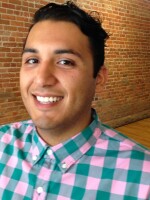
What do hip-hop and STEM (science, technology, engineering, and mathematics) have in common?
Dr. Chris Emdin of Columbia University says hip-hop and science are both "a way of looking at the world and delving deeply into a topic to form a conclusion." Emdin argues commonality between the two involve complicated problem solving techniques and approval from others in the same field. Just as scientists seek validation of their experimental findings, musicians seek communal approval of their works.
WHY MEMORIZE THINGS I HAVE ACCESS TO?
Dr. Emdin speaks at the North Carolina Science Festival’s High School Hackathon which seeks to get students thinking creatively in STEM classes. He argues that the way most schools teach science is outdated.
"We're preparing kids for jobs that don't exist," Emdin told Frank Stasio of WUNC's The State of Things. He believes the memorization and rote training in science classrooms don't offer kids what they really need to succeed in a society where most people have smartphones.
"Why memorize things I have access to?," Emdin asked. "Teach me how to think instead."
In place of traditional learning, Emdin believes teachers should start science education with topics that kids are already interested in, even if that means bringing hip-hop and rap into the classroom. Emdin described how kids can be engaged in computer science and physics by learning how coding and sound waves form their favorite music.
"Once they [students] gravitate towards something naturally, they want to know about how that works," he said. "The science becomes a language so that you can understand what you are already passionate about better."
"We're preparing kids for jobs that don't exist."
Emdin argues that this type of education not only better prepares students, but that it also keeps greater numbers of students engaged in science and learning, especially student populations that are often left behind.
"Rather than weed out populations from the beginning, why not engage them from the beginning?," Emdin asks.
Crystal Adams, director of diversity, engagement and outreach at The Morehead Planetarium and Science Center, agrees that meeting kids where they are is important for engaging students. For Adams, that means not only finding subjects that interest students, but physically bringing laboratories to students in rural areas.
"We have research mobile labs that travel on wheels so we can go to Bertie County, we can go to Hartford County and bring students a research lab they would have in Chapel Hill," Adams told The State of Things.
Adam Kline, chief strategist for American Underground in Durham, believes that in addition to finding engaging topics for scientific inquiry, educators need to be in frequent communication with the business community to find out which skills will be most valuable for their students. American Underground has partners with the private sector and universities to teach students skills relevant to today's jobs: software development and coding. One of those programs is called Code the Dream, which offers instruction to students from immigrant families.
"Literally, in one month these students are building Pinterest."
Kline says he thinks teaching kids skills like coding and software development will prepare them to take high-paying jobs in the technology sector, right out of high school. Kline is one of several organizers of the North Carolina Science Festival. The festival continues until April 26 at various locations throughout the state.

















